Related Research Articles
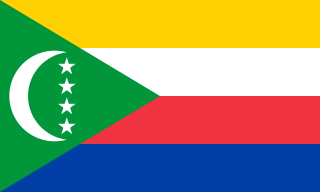
The Comoros, officially the Union of the Comoros, is an archipelagic country made up of three islands in Southeastern Africa, located at the northern end of the Mozambique Channel in the Indian Ocean. Its capital and largest city is Moroni. The religion of the majority of the population, and the official state religion, is Sunni Islam. Comoros proclaimed its independence from France on 6 July 1975. The Comoros is the only country of the Arab League which is entirely in the Southern Hemisphere. It is a member state of the African Union, the Organisation internationale de la Francophonie, the Organisation of Islamic Co-operation, and the Indian Ocean Commission. The country has three official languages: Shikomori, French and Arabic.
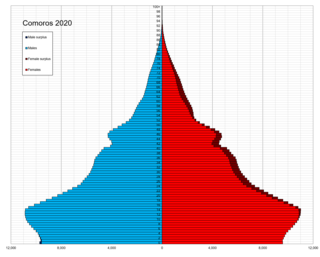
The Comorians inhabiting Grande Comore, Anjouan, and Mohéli share African-Arab origins. Islam is the dominant religion, and Quranic schools for children reinforce its influence. Although Islamic culture is firmly established throughout, a small minority are Christian.
Comorian is the name given to a group of four Bantu languages spoken in the Comoro Islands, an archipelago in the southwestern Indian Ocean between Mozambique and Madagascar. It is named as one of the official languages of the Union of the Comoros in the Comorian constitution. Shimaore, one of the languages, is spoken on the disputed island of Mayotte, a French department claimed by Comoros.

Islam is the largest religion in the Comoros. According to the 2006 estimate by the U.S. Department of State, roughly 98% of the population in the Comoros is Muslim. Virtually all Muslims in the Comoros are Sunni belonging to Shafi'i school of jurisprudence. Most adherents are Arab-Swahili, but there are also people of Indian, largely Gujarati, descent.
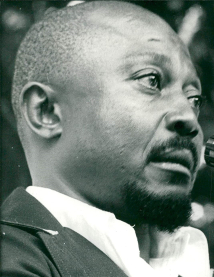
Ali Soilih M'Tsashiwa was a Comorian socialist revolutionary and political figure who served as the 3rd President of the Comoros from 3 January 1976 to 13 May 1978.
The franc is the official currency of Comoros. It is nominally subdivided into 100 centimes, although no centime denominations have ever been issued.
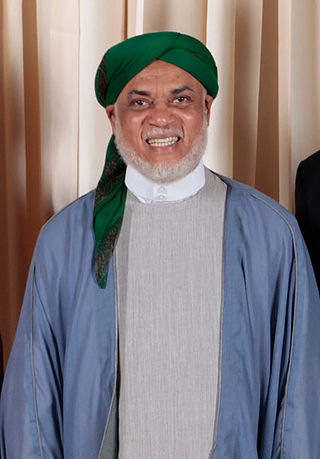
Sayyid Ahmed Abdallah Mohamed Sambi is a Comorian Islamic leader and politician, and former President of Comoros. He is popularly known as 'Ayatollah'. After easily winning the 14 May 2006 presidential election with 58.02% of the national vote, Sambi was inaugurated as President of the Union of the Comoros on 26 May 2006. It was the first peaceful transfer of power in the history of the Comoros.
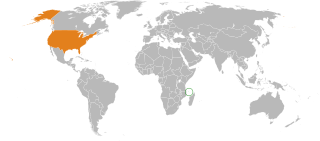
Comoros–United States relations are the international relations between the Comoros and the United States. The United States recognized the Comorian Government in 1977.

The predominant religion in the Comoros is Islam, with a small Christian minority. Although the constitution, as revised in 2018, removed the reference to a state religion in the 2009 constitution, stating simply that Sunni Islam is the source of national identity, a 2008 law promulgated in January 2013 outlawed the practice of other forms of Islam in the country. Propagation of non-Islamic religions is prohibited.

The Comorian passport is issued to citizens of the Union of the Comoros for international travel. As of 1 January 2017, Comorian citizens had visa-free or visa on arrival access to 48 countries and territories, ranking the Comorian passport 88th in terms of travel freedom according to the Henley visa restrictions index.

The official languages of the Comoros are Comorian, French and Arabic, as recognized under its 2001 constitution. Although each language holds equal recognition under the constitution, language use varies across Comorian society. Unofficial minority languages such as Malagasy and Swahili are also present on the island with limited usage. According to Harriet Joseph Ottenheimer, a professor of anthropology at Kansas State university, the linguistic diversity of the Comoros is the result of its rich history as part of the Indian maritime trade routes and its periods of Malagasy and French colonial rule.

The Juwa Party is a political party in the Comoros. The party was established by former president Ahmed Abdallah Mohamed Sambi in 2013 and became the main opposition party in 2015. After boycotting the 2020 elections, it currently has no representation in parliament.
Djaffar Ahmed Said Hassani is Comorian politician from Grande Comore. From 26 May 2016, he served as the Vice-President of the Comoros for Economy, Planning, Industry, Crafts, Investments, Private Sector and Land Affairs in the Comoros.
Safwan Mbaé is a professional footballer who plays as a centre-back for Championnat National 3 club Bourgoin-Jallieu. Born in France, he plays for the Comoros national team.

Younn Zahary is a professional footballer who plays as a centre-back for A Lyga club Žalgiris. Born in France, Zahary represents the Comoros at international level.
Nasser Mahmoud Noor is an Emirati footballer who plays as a midfielder.

Faiz Mattoir is a professional footballer who plays as a winger for the Dutch Eerste Divisie club Almere City. Born in Mayotte, France, he plays for the Comoros national team.

Parliamentary elections were held in the Comoros on 19 January 2020; in constituencies where no candidate received a majority, a second round was held alongside local elections on 23 February. The elections were boycotted by the main opposition parties, including the two largest parties in the outgoing Assembly, the Union for the Development of the Comoros and Juwa Party, in protest at constitutional reform and political repression, The result was a landslide victory for President Azali Assoumani's Convention for the Renewal of the Comoros, which won 20 of the 24 elected seats.
Ghanem Ahmad Ghanem Mohammad is an Emirati footballer who plays as a winger for Al-Wasl.
Iyad Inomse M'Vourani Mohamed is a professional footballer who plays as a midfielder for Ligue 2 club Pau FC. Born in France, he represents the Comoros national team.
References
- ↑ "Emiratos y el pasaporte de Comoros, extraña simbiosis". The Line Breaker (in Spanish). 30 December 2019. Retrieved 10 February 2020.
- ↑ Waleed Al-Hammadi at Soccerway. Retrieved 1 February 2020.
